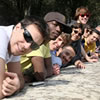Nine young people from nine different countries had a chance to each comment and ask a question to Pope Francis, during the online conversation, on 1 November 2022.
At the beginning of the conversation, the Holy Father said young people are the roots. He said the stronger they are, the stronger their roots will be. He urged them not to be individual roots and that their roots must turn into a tree which in turn can lead to fruits.
Talking about the past Pope Francis said history is not always a pleasant story, “History can be very harsh. There are people who have built their history on blood, and many of you belong to those people.” The Pope, therefore, urged young people to take a history of their people as part of themselves, as part of their own maturity. He noted that all people are born as something small and can only be mature if one accepts the burden of history, the good and the bad part of it. “The bad part of history you are familiar with, exploitation, slavery. You know what it means to exploit Africa without allowing it to grow,” added the Holy Father.
The Pope went on to speak about the concept of Ubuntu which said he would like to express his appreciation for and that he believes that encounter of ubuntu people can be led forward, “The richness of your ubuntu as a form of salvation through the community.”
According to Pope Francis through the term ubuntu Africans are their own masters, “You are your own missionaries. Run forward. Africa is not meant to be exploited.” Pope Francis said Africa is not meant to be seen as a subculture and young African have to appreciate the wealth that they have.
Clevine Kavira from DRC asked about the trip that was cancelled that the Holy was due to make to the DRC and South Sudan. In response, Pope Francis said if all goes well in early February 2023, he will make the promised trip to Africa.
To Devis Ampereza from Uganda who spoke about the endless wars in Africa, the Holy Father said If people were to stop selling arms that would stop hunger for one year. He said the sale of arms keeps people in slavery.
Akakpo Ghislain from the Ivory Coast talked about the problem of deforestation in his country and the role of multinational companies in this problem. The Pope said the multinational corporations that exploit nature need to be looked at.
The Pope said he is also concerned by the problem of fundamentalism, terrorism, banditry when Osemeke Augustine Chidera from Nigeria spoke about the problems that are faced by Nigerians, especially the persecution of Christians. Pope advised that young people cannot be passive and they need to equip themselves with religious doctrine. He said politics is the highest form of charity because it is geared towards common good and urged young people to inform themselves about the political situation of the countries. But he advised them be cautious and smart too, and learn from elders, asking for their suggestions and guidance. “Keep in mind that God loves you.”
Biligui Nelly Didiane from Cameroon also had a chance to speak to the Pope and she said young people feel cornered by politicians and social injustices leave many without hope and in a situation of insecurity. Didiane felt that the Church can be at the forefront of the economic liberation of its people through empowerment projects. The Pope then acknowledged that one of the problems young people are facing is the lack of professional integration as was mentioned by Didiane. The Pope said the Church can do more in promoting young people even from schools and universities, “Without cooperating with the powers that oppress universities have to be free and young people have to grow in freedom. Young people have to have a mature mind, a mature heart, and the ability to act.”
Kelvin Takudzwa Tsuro from Zimbabwe said young people are struggling with their identity. He wanted to know what it really means to be an African young Catholic because there are today identities have become confused, sexual, racial, ethnic, and religious. Tsuro said the young in living in a highly disintegrated society and the young people are caught up in the situation. He said young people wish to live the message of the Gospel and ubuntu. They wish to participate in decision makings of the church even though their culture states that young people must not participate in the meeting of the elders.
In response, the Pope admitted that the identity of young people is a serious question, “In this day and age identities are being questioned. We ask ourselves, what is identity? And therefore, young people ask themselves, who are we young Africans?” The Pope said young people were not born out of magic, they have history and roots. “If young people don’t have about the roots they received, their families, countries, history, then young people cannot become mature,” said Pope Francis, urging young people to be aware of their roots. He also said young people must not hide in their roots but take them into the future. “Young Christians have a duty to be engaged, otherwise they wouldn’t be Christian.”
In closing, the Holy Father said he was glad to have had a meeting with the young people of Africa and was impressed by their remarks. He reiterated that he believes young Africans have values and asked them to continue to be engaged without ever forgetting to keep their roots in mind. He reminded the young people that they were not born under a tree but were born with a history.
Pope Francis advised the young people of Africa to live in the present with a firm view of reality and try not to be alienated. “Don’t stop dreaming because when young people stop dreaming that’s when countries come to an end.”

